Proper denture care is essential for enhancing oral health, preventing complications, and ensuring comfort. Regular maintenance helps maintain the fit, functionality, and appearance of dentures, promoting long-term satisfaction and overall well-being.
1.1 Importance of Proper Denture Maintenance
Proper denture maintenance is crucial for ensuring comfort, functionality, and oral health. Neglecting denture care can lead to plaque and tartar buildup, which can irritate gums, cause stains, and harbor harmful bacteria and fungi. This can result in bad breath, gum inflammation, and increased risk of infections. Regular cleaning and soaking help prevent these issues, maintaining the denture’s appearance and fit. Additionally, proper care extends the lifespan of dentures, ensuring they remain functional and comfortable. Ignoring maintenance can lead to discomfort, difficulty chewing, and potential damage to the dentures. By prioritizing denture care, individuals can protect their oral health and enjoy a better quality of life. Regular maintenance is essential for optimal results.
1.2 Overview of Denture Care Instructions
Proper denture care involves a combination of daily cleaning, soaking, and storage practices to maintain hygiene and functionality. Dentures should be removed and rinsed after meals to eliminate food particles. Brushing with a soft-bristled denture brush and mild cleanser is essential to remove plaque and stains. Soaking dentures overnight in water or a recommended solution helps maintain their shape and cleanliness. Avoid using harsh chemicals or toothpaste, as they can damage the material. Regularly cleaning and maintaining dentures prevents bacterial buildup, ensures comfort, and extends their lifespan. Proper care also involves storing dentures in a safe place, away from direct sunlight and heat, to prevent warping or cracking. Following these steps ensures optimal denture performance and oral health.
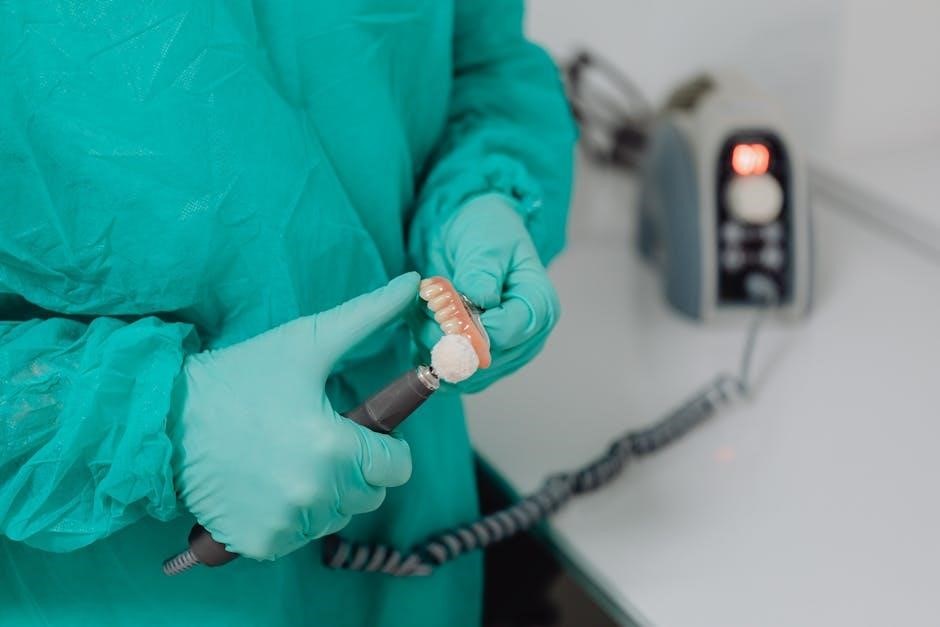
Daily Cleaning of Dentures
Daily cleaning involves removing and rinsing dentures after meals to eliminate food particles. Brushing with a soft-bristled denture brush and mild cleanser removes plaque and stains effectively.
2.1 Removing and Rinsing Dentures After Meals
After each meal, remove your dentures and rinse them thoroughly under running water to eliminate loose food particles. This simple step prevents debris buildup, which can lead to plaque and stains. Regular rinsing also reduces the risk of bacterial and fungal growth, maintaining hygiene and freshness. Pay attention to all surfaces, ensuring no food remains trapped. Use gentle pressure to avoid damaging the denture material. This practice not only keeps your dentures clean but also supports overall oral health by preventing irritation and infections; Consistency is key to maintaining a healthy, comfortable fit and extending the lifespan of your dentures.
2.2 Brushing Dentures Daily
Brushing your dentures daily is crucial for removing plaque, bacteria, and stains, ensuring they remain clean and hygienic. Use a soft-bristled denture brush and a mild cleanser, such as liquid soap or denture-specific paste, to gently scrub all surfaces. Avoid using toothpaste, as it can scratch the denture material. Brushing helps prevent the buildup of harmful substances that can irritate gums and lead to infections. Regular brushing also maintains the appearance of your dentures, keeping them looking natural and polished. Rinse thoroughly after brushing to remove any remaining cleanser. This daily routine is essential for fresh breath, comfort, and the longevity of your dentures, ensuring they fit well and function properly.
2.3 Using Denture Brushes and Mild Cleansers
Using the right tools and cleansers is vital for effective denture cleaning. A soft-bristled denture brush is designed to gently remove plaque and debris without damaging the denture material. Pair this with a mild cleanser, such as liquid soap or a denture-specific paste, to avoid scratching or discoloring your dentures. Avoid harsh chemicals or abrasive products, as they can weaken the denture material. Gently scrub all surfaces, including the underside and between teeth, to ensure a thorough clean. This method prevents the buildup of bacteria and stains, maintaining your dentures’ hygiene and appearance. Regular use of appropriate brushes and cleansers ensures your dentures remain clean, functional, and comfortable to wear.
2.4 Avoiding Toothpaste and Harsh Chemicals
Toothpaste and harsh chemicals should never be used on dentures, as they can cause irreversible damage. Toothpaste contains abrasive ingredients that scratch the denture surface, leading to stains and bacteria buildup. Harsh chemicals, such as bleach, can weaken the denture material, discolor it, or damage any metal components. Instead, opt for mild cleansers specifically designed for dentures to clean them gently and effectively. Always rinse your dentures thoroughly after cleaning to remove any residue. This approach ensures your dentures remain in optimal condition, maintaining their appearance and functionality while promoting oral health. By avoiding harmful products, you extend the lifespan of your dentures and prevent unnecessary repairs or replacements.
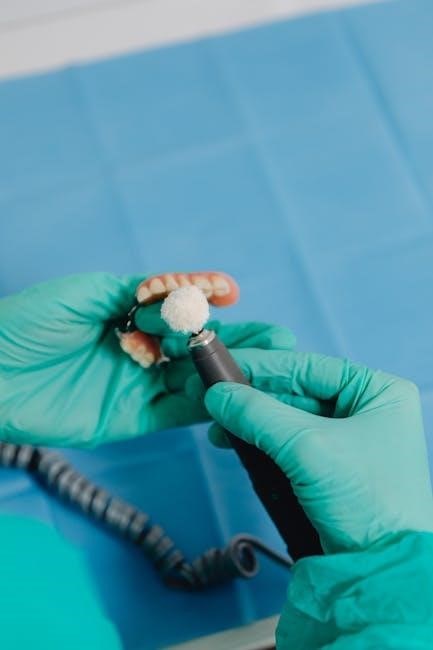
Soaking and Storing Dentures
Soaking dentures overnight in water or a mild cleanser helps maintain their shape and hygiene. Store them in a safe, cool place to avoid warping or damage.
3.1 Overnight Soaking in Water or Cleanser
Overnight soaking is crucial for maintaining denture hygiene and fit. Submerge dentures in water or a mild denture cleanser to remove plaque and bacteria. This process helps prevent the buildup of harmful microorganisms and keeps the dentures fresh. Soaking also ensures that the dentures retain their shape and remain comfortable. Always rinse thoroughly with cold water before reinserting to avoid any residual cleanser taste. Avoid using harsh chemicals or bleach, as they can damage the material. If using cleansing tablets, follow the manufacturer’s instructions carefully. Soaking overnight is a simple yet effective step in your daily denture care routine.
3;2 Storing Dentures in a Safe Place
Storing dentures in a safe and secure location is vital to prevent damage or loss. When not in use, place your dentures in a protective case or container filled with water to maintain moisture and shape. Avoid leaving them exposed to direct sunlight, heat sources, or pets, as these can cause warping or damage. Keep the storage area clean and away from children to ensure safety. Placing a towel in the sink while cleaning can prevent accidental drops and breaks. Treating your dentures with care during storage ensures they remain in excellent condition and continue to provide comfort and functionality. Proper storage is a simple yet crucial step in maintaining your denture investment.
3.3 Avoiding Direct Sunlight and Heat
Exposure to direct sunlight and heat can cause dentures to warp or discolor. Prolonged exposure may lead to structural changes in the acrylic or resin materials, affecting their fit and comfort. Heat sources, such as heaters or hot water, should be avoided to prevent damage. When storing dentures, keep them away from direct sunlight and avoid placing them near radiators or open flames. This precaution ensures the dentures retain their shape and functionality. Always store them in a cool, shaded area or a protective case to maintain their integrity and prolong their lifespan. Proper care in this regard is essential for preserving the quality and performance of your dentures.

Maintaining Gum and Oral Health
Proper oral hygiene practices are crucial for denture wearers to ensure healthy gums and overall mouth health. Regular brushing of gums, tongue, and palate helps prevent infections and maintains tissue integrity.
4.1 Brushing Gums, Tongue, and Palate
Brushing your gums, tongue, and palate is vital for maintaining oral health, especially when wearing dentures. Use a soft-bristled toothbrush to gently clean these areas, ideally twice daily. This practice helps remove bacteria, plaque, and debris, preventing infections and bad breath. Massaging the gums can also improve blood circulation and maintain tissue health. Avoid using toothpaste on your gums if it irritates them, but a mild cleanser or water is acceptable. Regular brushing promotes a clean environment for your dentures and supports overall oral hygiene. By keeping these areas clean, you reduce the risk of oral infections and ensure a fresh, healthy mouth. This habit is essential for long-term denture comfort and health.
4.2 Allowing Gums to Rest Overnight
Allowing your gums to rest overnight is crucial for maintaining their health and ensuring proper denture fit. Removing dentures at night gives your gums time to recover and replenish themselves. This practice helps prevent irritation, inflammation, and potential tissue damage caused by constant pressure. Without dentures, your gums can naturally regenerate and stay healthy. Soaking dentures overnight in water or a cleansing solution also supports this process by keeping them clean and free from bacteria. Always rinse your dentures thoroughly before reinserting them in the morning. This nightly routine is essential for promoting long-term oral health and preventing complications associated with prolonged denture wear. It ensures your gums remain strong and resilient.
4.3 Preventing Oral Infections and Diseases
Preventing oral infections and diseases is a critical aspect of denture care. Poorly maintained dentures can harbor bacteria, fungi, and other microorganisms, leading to conditions like denture stomatitis or thrush. Regular cleaning, rinsing, and soaking dentures help eliminate these pathogens. Using effervescent cleansers designed for dentures can effectively target bacteria and fungi. Additionally, brushing the gums, tongue, and palate daily with a soft-bristled brush promotes oral hygiene and reduces infection risk. Avoiding overnight wear allows gums to recover and reduces microbial buildup. Proper care practices, such as avoiding harsh chemicals and bleaching products, further safeguard against infections. By following these steps, you can maintain a healthy oral environment and prevent complications associated with denture use. Regular dental check-ups are also essential for early detection and treatment of any issues.
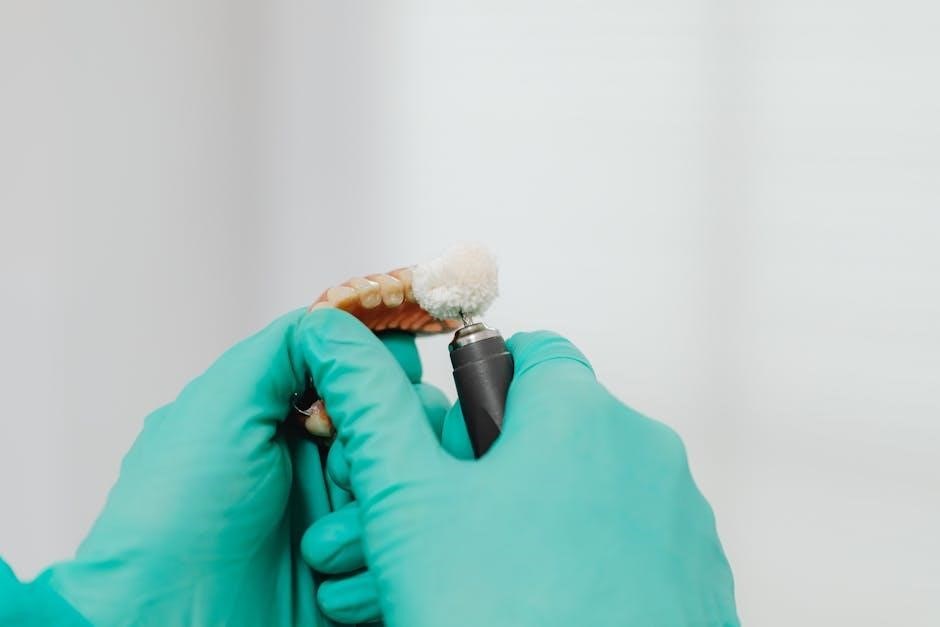
Adjusting to New Dentures
Adjusting to new dentures requires patience and practice. Start with soft foods, gradually introducing more textures to build chewing confidence. Practice speaking slowly to improve clarity and articulation. Regular dental follow-ups ensure proper fit and address any discomfort promptly. Over time, dentures become a natural part of your daily routine, enhancing both function and appearance. Consistent care and adaptation lead to a seamless transition, restoring your ability to eat, speak, and smile comfortably.
5.1 The Adjustment Period Explained
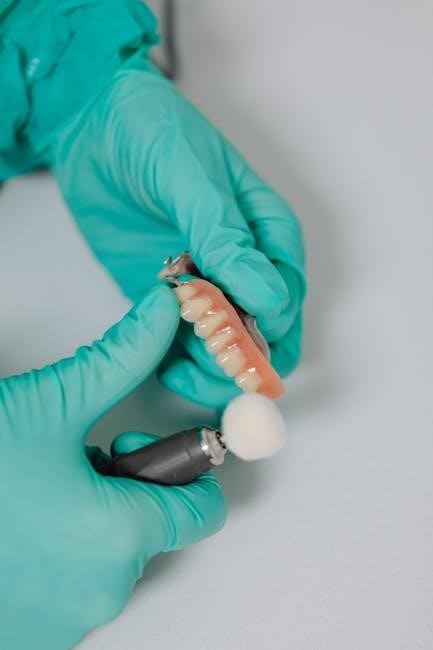
The adjustment period for new dentures varies, typically lasting a few weeks to months, depending on individual factors like dental history and the type of denture. During this time, patients may experience mild discomfort, sore spots, or difficulty speaking and eating. It’s important to start with soft foods and gradually introduce more complex textures to build chewing confidence. Speaking may feel awkward at first, but practicing in front of a mirror or with a friend can improve clarity. Regular follow-ups with your dentist are crucial to address any fit issues and relieve discomfort. Patience and consistent practice are key to adapting to your new dentures and restoring normal oral function.
5.2 Managing Sore Spots and Discomfort
Sore spots and discomfort are common during the initial adjustment to new dentures. To alleviate these issues, apply a cold compress or ice pack to reduce swelling. Gently massaging the affected gum area with a clean finger can also provide relief. Avoid sleeping with your dentures unless instructed by your dentist, as this can exacerbate irritation. If using denture adhesive, follow the instructions carefully to prevent residue buildup. Regular dental check-ups are essential for adjustments to ensure a proper fit. Additionally, rinsing with warm saltwater can help soothe irritated tissues. Always avoid harsh products like bleach or abrasive cleaners, as they can damage the dentures. Proper care and patience will help your mouth adapt to your new dentures.
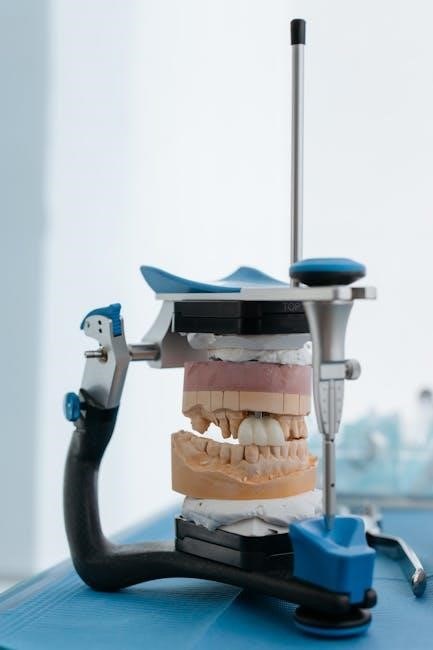
5.3 Learning to Eat and Speak with Dentures
Adapting to eating and speaking with dentures requires patience and practice. Start with soft foods, cutting them into small pieces to ease chewing. Avoid sticky or hard foods initially to prevent discomfort or displacement. When speaking, enunciate clearly and practice in front of a mirror to improve articulation. Over time, your mouth will adapt, making speech more natural. Chewing slowly and using both sides of your mouth can help stabilize the dentures. Gradually introduce a variety of foods as confidence grows. Staying relaxed and taking small steps will help you master these skills effectively. Regular dental check-ups can also ensure proper fit and address any issues promptly.

Advanced Care Tips
Use denture cleansing tablets for deep cleaning, avoid bleaching agents, and handle dentures carefully to prevent damage. Regular dental check-ups ensure optimal fit and functionality.
6.1 Using Denture Cleansing Tablets
Denture cleansing tablets are an effective way to deep clean dentures, removing plaque, tartar, and bacteria. They work by creating a fizzing action that loosens debris. Simply soak the dentures in water with one tablet for the recommended time, usually 15–30 minutes. After soaking, thoroughly rinse the dentures with cold water to remove any remaining cleanser. This method is especially useful for tackling stubborn stains and odors. However, always follow the manufacturer’s instructions and ensure the tablets are specifically designed for dentures. Avoid using bleach or harsh chemicals, as they can damage the denture material. Regular use of cleansing tablets can help maintain a clean, fresh, and hygienic denture.

6.2 Avoiding Bleaching Products
Bleaching products should never be used to clean dentures, as they can weaken the acrylic base and metal components, leading to discoloration or structural damage. Bleach can also cause the denture teeth to become brittle or discolored. Instead, opt for mild denture cleansers or tablets specifically designed for dentures. These products are safe and effective for removing stains and bacteria without causing harm. If you notice stubborn stains, consult your dentist for professional cleaning. Always avoid harsh chemicals, as they can compromise the integrity of your dentures. Proper care ensures your dentures remain durable, comfortable, and functional for years to come.
6.3 Handling Dentures Safely
Handling dentures safely is crucial to prevent damage and ensure longevity. Always clean them over a sink filled with water or a soft towel to avoid breakage if dropped. Avoid exposing dentures to direct sunlight or heat, as this can warp or discolor the material. Use a soft-bristled brush and mild cleansers to gently remove plaque and stains without scratching the surface. Never use harsh chemicals or abrasive materials, as they can weaken the denture base or damage the teeth. If dentures are dropped, rinse them with cold water and inspect for cracks or damage. Store them in a protective case when not in use to prevent accidental harm. Regular safe handling ensures your dentures remain in excellent condition for years.
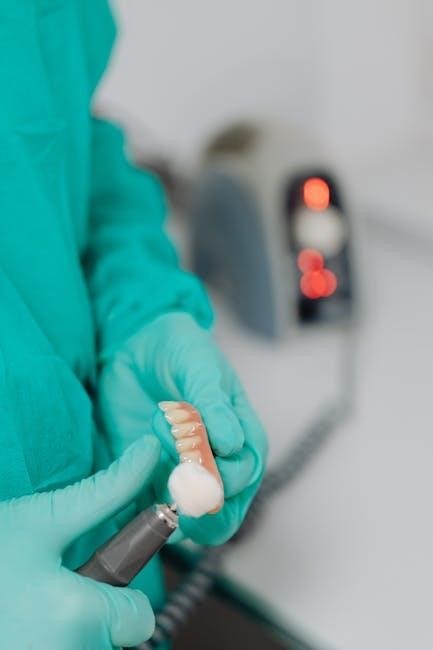
Troubleshooting Common Issues
Common denture issues include loose fits, discomfort, and stains. Addressing these problems promptly prevents further complications and ensures optimal comfort and functionality for the wearer.
7.1 Dealing with Loose-Fitting Dentures
Loose-fitting dentures can cause discomfort and hinder proper chewing and speaking. They may result from bone resorption, weight loss, or natural wear. To address this, visit your dentist for adjustments or relining. Avoid using excessive denture adhesive as a permanent solution. Proper fitting ensures better stability and prevents irritation. Regular check-ups help maintain optimal fit and functionality, enhancing overall comfort and confidence for denture wearers. Addressing this issue promptly prevents further complications and ensures long-term satisfaction with your dentures.
7.2 Removing Denture Adhesive Residue
Removing denture adhesive residue is crucial for maintaining oral hygiene and ensuring proper denture fit. After taking out your dentures, gently wipe the adhesive from your gums using a soft cloth or your fingers. Rinse your mouth with warm water to remove any remaining residue. For tougher adhesive, soak your dentures in a mild soap solution or denture cleanser. Avoid using harsh chemicals or abrasive materials, as they can damage the dentures. After soaking, rinse thoroughly with cold water and pat dry. Regularly cleaning adhesive residue prevents gum irritation and ensures a secure fit. Proper removal also helps maintain the effectiveness of the adhesive for future use.
7.3 Repairing Damaged Dentures
Damaged dentures can cause discomfort and affect their functionality. If your dentures are cracked, chipped, or loose, contact your dentist immediately for professional repair. Avoid using glue or DIY fixes, as they can worsen the damage. In the meantime, store your dentures in a protective case to prevent further harm. Your dentist will assess the damage and repair or replace the dentures as needed. Regular check-ups can help identify issues early, preventing more extensive repairs. Proper care and handling are essential to extend the life of your dentures and maintain their performance. Always prioritize professional assistance for any damage to ensure a proper and safe fix.
Proper denture care is vital for maintaining oral health, comfort, and functionality. Regular cleaning, soaking, and professional check-ups ensure long-lasting performance and prevent complications. Prioritize your dental well-being.
8.1 Summary of Key Denture Care Practices
Proper denture care involves daily cleaning, soaking overnight, and avoiding harsh chemicals. Remove and rinse dentures after meals to prevent debris buildup. Brush gums, tongue, and palate to maintain oral hygiene. Soak dentures in water or cleanser to keep them moist and clean. Avoid using toothpaste or bleach, as they can damage the material. Store dentures safely away from direct sunlight and heat. Regular dental check-ups are crucial for ensuring a proper fit and addressing any issues promptly. By following these practices, you can extend the life of your dentures, maintain oral health, and enjoy a comfortable, confident smile. Consistency is key to optimal denture care and overall well-being.
8.2 Importance of Regular Dental Check-Ups
Regular dental check-ups are crucial for maintaining the health and functionality of your dentures. During these visits, your dentist can inspect for wear and tear, ensure a proper fit, and address any issues before they become major problems. Poorly fitting dentures can cause discomfort, sores, or even lead to more severe oral health issues. Your dentist can also clean and polish the dentures, removing stubborn stains and tartar buildup. Additionally, these check-ups provide an opportunity to discuss any concerns or adjustments needed. By staying consistent with dental appointments, you can extend the life of your dentures and maintain a healthy, comfortable smile for years to come. Regular check-ups are a vital part of overall denture care and oral health management.
